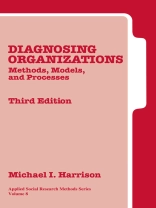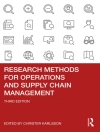Click ′Additional Materials′ for downloadable sample chapter
Many managers and organizational leaders face shrinking budgets, growing competition, and changing organizational alliances and missions A bewildering array of new technologies and management techniques offer help in handling these challenges. To respond effectively and avoid wasting resources, decision makers need to diagnose organizational conditions, plan changes carefully, and apply appropriate technologies and management techniques.
The Third Edition of the bestselling Diagnosing Organizations shows how consultants and applied researchers can help decision makers quickly and flexibly diagnose problems and challenges and decide how to deal with them.
Key Features
- Models for framing diagnostic problems, identifying underlying conditions, and providing feedback
- Methods for gathering and analyzing diagnostic data
- Processes for working on a diagnosis with clients and other members of an organization
This thoroughly revised edition can help practitioners of diagnosis directly address concerns that are critical to clients, rather than just provide feedback on current conditions and operations. In an authoritative, yet readable fashion author Michael I. Harrison presents updated treatments of the uses of diagnosis, evaluating organizational effectiveness, improving team performance, planning organization redesign projects, and assessing organization-environment relations and competitive strategy. Also treated are the politics of change management, professional dilemmas, and ethical issues confronting practitioners.
Professors of research methods across the social sciences will find Diagnosing Organizations, Third Edition an invaluable text for their courses. The second edition was widely adopted in departments of Management, Public Health, Nursing, Education, Public Administration, Psychology, Criminal Justice, and many others.
Зміст
Preface
1. Diagnosis: Approaches and Methods
Uses of Diagnosis
Three Keys to Successful Diagnosis
Diagnosis in Turbulent Times
Conclusion and Plan of the Book
Exercise
2. Open Systems Models
Using the Open Systems Approach
Gathering and Analyzing Data
Assessing Effectiveness
Assessing Feasibility of Change and Choosing Appropriate Interventions
Exercises
3. Assessing Individual and Group Behavior
Model for Diagnosing Individual and Group Behavior
Action Model for Group Task Performance
Diagnostic Methods and Procedures
Exercises
4. System Fits and Organizational Politics
Diagnosing System Fits
Emergent Behavior and Culture Versus Official Mandates
Assessing the Impacts of Fits and Gaps
Power and Politics
Exercises
5. Environmental Relations
Guidelines for Diagnosis
Diagnostic Methods
Exercises
6. Challenges and Dilemmas of Diagnosis
The Goals Dilemma
The Politics Dilemma
The Professionalism Dilemma Conclusion
Conclusion
Appendix A: General Orientation Interview
Appendix B: Instruments for Diagnosis and Assessment
Appendix C: A Guide to Diagnosing Behavior During Meetings
Appendix D: Resources for Developing Expertise in Diagnosis
References
Index
About the Author
Про автора
Michael I. Harrison, Ph.D, is a Senior Social Scientist in the Center for Delivery, Organization, and Markets at the Agency for Healthcare Research and Quality (AHRQ). He leads Agency activities in Health System Design, manages and contributes to research in delivery systems across the United States, and conducts research on organizational improvement and implementation of system change. His publications include papers in leading health services research journals, Diagnosing Organizations: Methods, Models, and Processes (Sage, 2005), and Implementing Change in Health Systems: Market Reforms in the United Kingdom, Sweden, and the Netherlands (SAGE, 2004). He has given presentations and led workshops at scientific and professional conferences throughout the United States and Europe.Dr. Harrison holds a Ph.D. in Sociology from the University of Michigan. He was previously a faculty member at the State University of New York (SUNY), Stony Brook, and at Bar Ilan University in Israel; a visiting professor at Boston College and Haifa University; and a visiting scholar at Brandeis University, Georgetown University, Harvard Business School, and the Nordic School of Public Health.












